2022届高考英语二轮复习:时态语态课件(64张)
文档属性
| 名称 | 2022届高考英语二轮复习:时态语态课件(64张) |  | |
| 格式 | pptx | ||
| 文件大小 | 182.9KB | ||
| 资源类型 | 教案 | ||
| 版本资源 | 通用版 | ||
| 科目 | 英语 | ||
| 更新时间 | 2022-04-03 18:34:26 | ||
图片预览

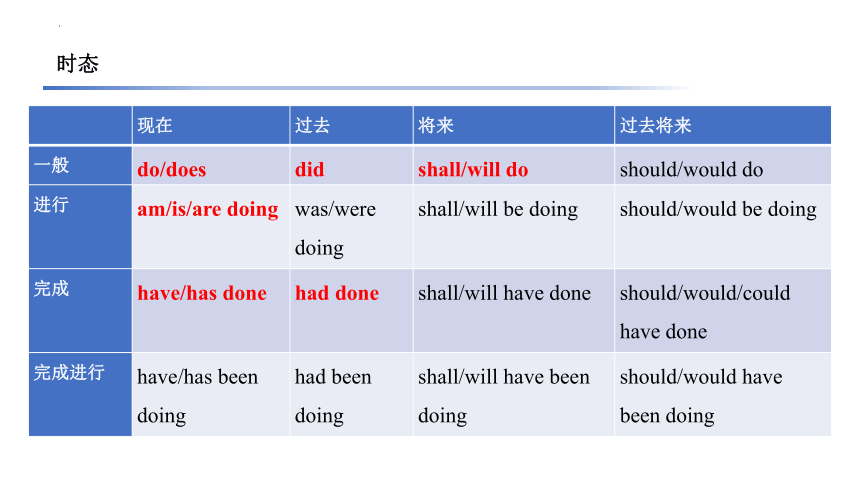

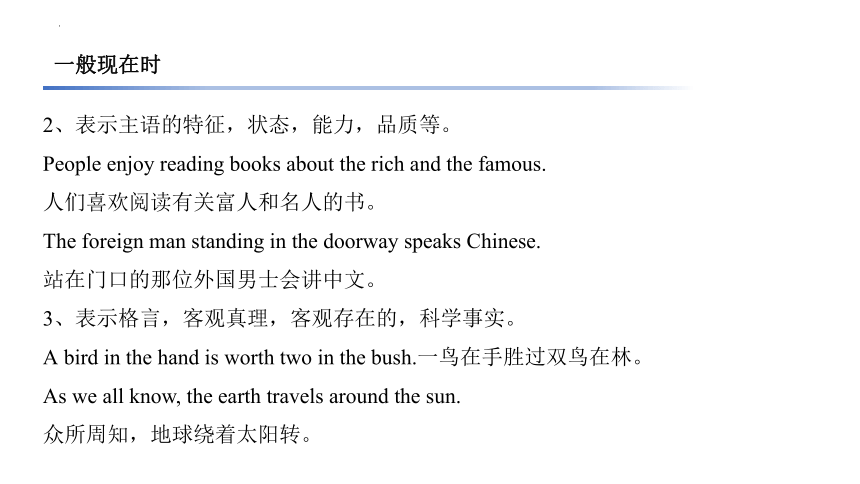
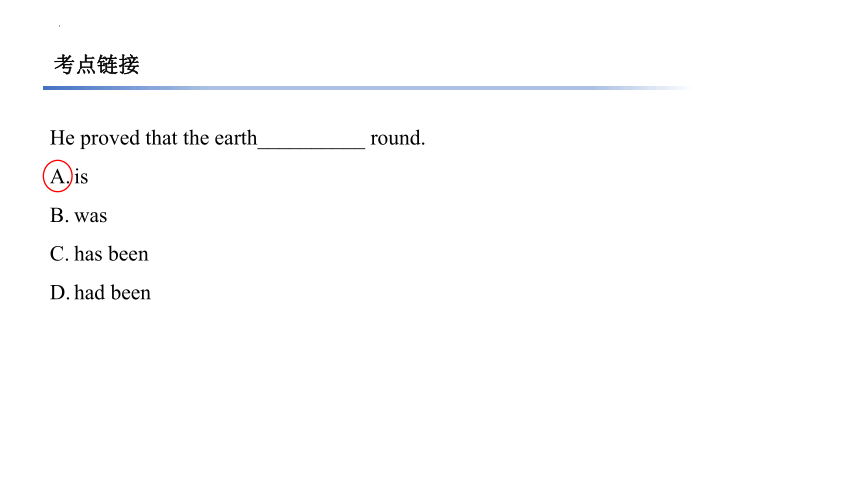
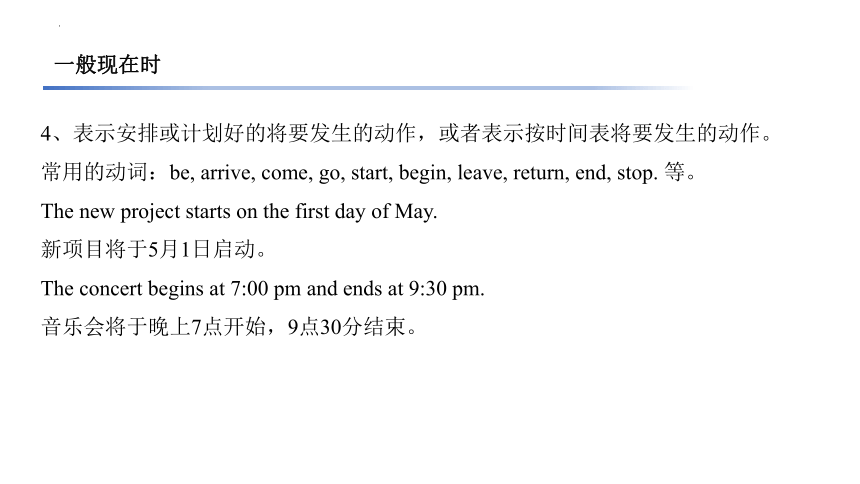

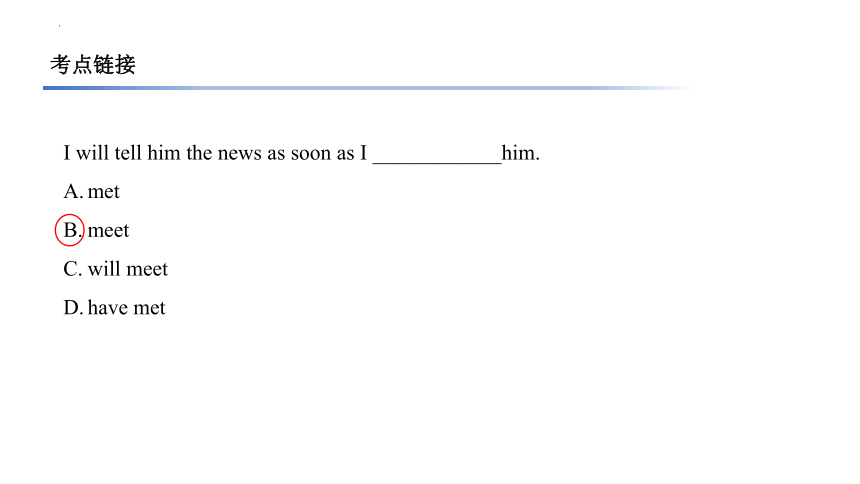
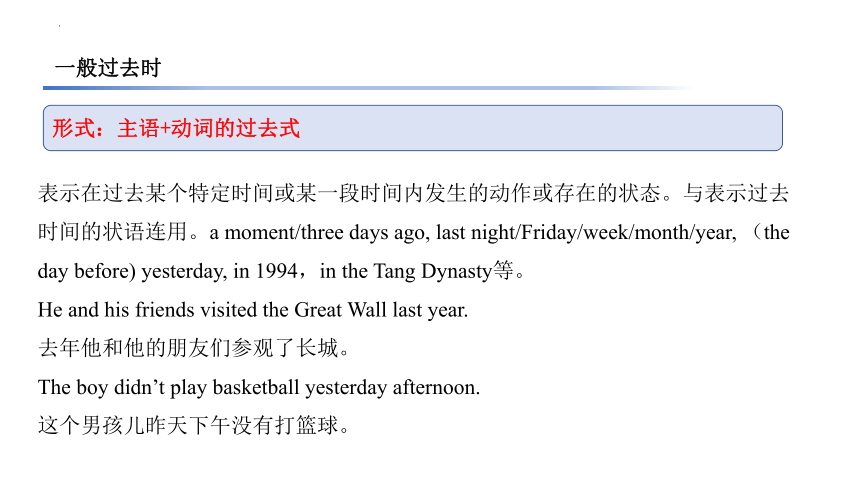
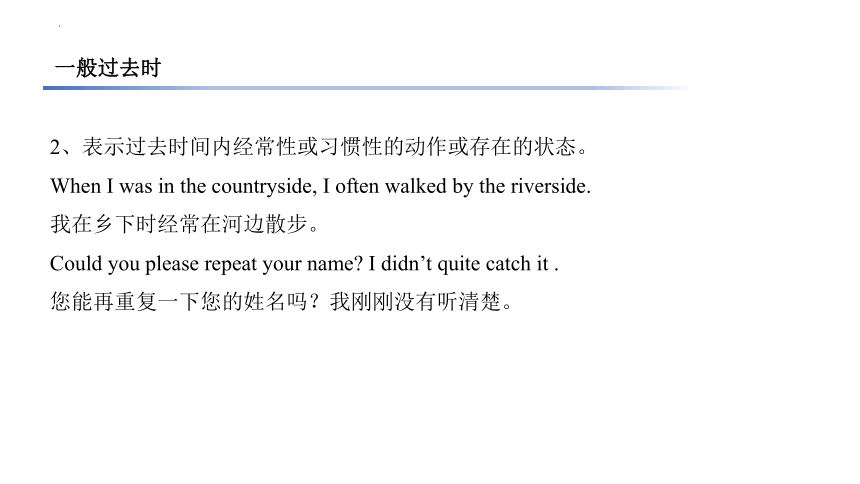
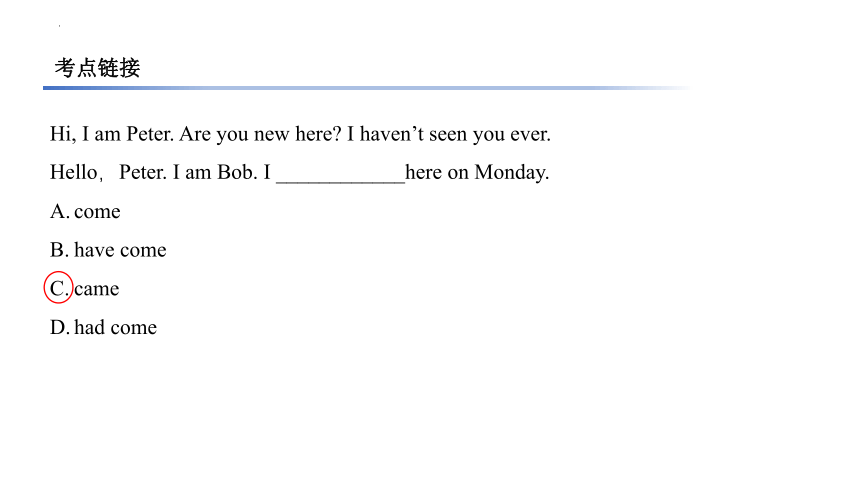
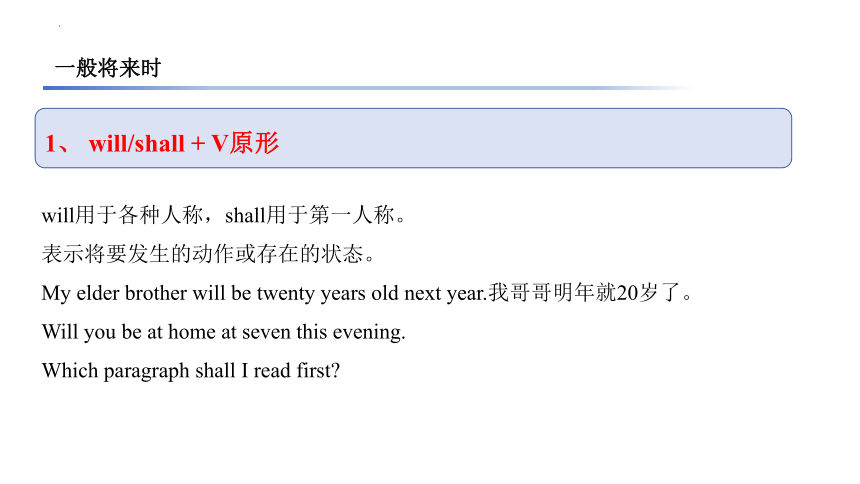
文档简介
(共64张PPT)
I love you.
I loved you.
I will love you.
I am loving you.
I have loved you.
时态
时态表示谓语动词的动作发生的时间和状态。
时间:现在,过去,将来,过去将来。
状态:一般,进行,完成,完成进行。
时态
现在 过去 将来 过去将来
一般 do/does did shall/will do should/would do
进行 am/is/are doing was/were doing shall/will be doing should/would be doing
完成 have/has done had done shall/will have done should/would/could have done
完成进行 have/has been doing had been doing shall/will have been doing should/would have been doing
一般现在时
形式:主语+谓语动词原形(单三形式:加s或者es)
1、表示经常性的和习惯性的动作或存在的状态。常与表示频度的时间状语连用:
always, often, usually, generally(通常情况下), sometimes, rarely(很少), never, once a week, twice a month, every day, now and then(有时)等。
Little children always fight among themselves. 小孩子之间总是打斗。
They go to the movies once a week to relax themselves.
他们每周去看一次电影来放松自己。
I see him now and then, but not often. 我偶尔看见他,但不经常见。
一般现在时
2、表示主语的特征,状态,能力,品质等。
People enjoy reading books about the rich and the famous.
人们喜欢阅读有关富人和名人的书。
The foreign man standing in the doorway speaks Chinese.
站在门口的那位外国男士会讲中文。
3、表示格言,客观真理,客观存在的,科学事实。
A bird in the hand is worth two in the bush.一鸟在手胜过双鸟在林。
As we all know, the earth travels around the sun.
众所周知,地球绕着太阳转。
考点链接
He proved that the earth__________ round.
is
was
has been
had been
一般现在时
4、表示安排或计划好的将要发生的动作,或者表示按时间表将要发生的动作。
常用的动词:be, arrive, come, go, start, begin, leave, return, end, stop. 等。
The new project starts on the first day of May.
新项目将于5月1日启动。
The concert begins at 7:00 pm and ends at 9:30 pm.
音乐会将于晚上7点开始,9点30分结束。
一般现在时
5、主句是一般将来时,时间和条件状语从句用一般现在时表将来。
We will discuss the matter when we meet tomorrow.
明天见面时,我们将会讨论这件事情。
I will not go to the countryside if it rains tomorrow.
如果明天下雨,我就不去乡下了。
考点链接
I will tell him the news as soon as I ____________him.
met
meet
will meet
have met
一般过去时
形式:主语+动词的过去式
表示在过去某个特定时间或某一段时间内发生的动作或存在的状态。与表示过去时间的状语连用。a moment/three days ago, last night/Friday/week/month/year, (the day before) yesterday, in 1994,in the Tang Dynasty等。
He and his friends visited the Great Wall last year.
去年他和他的朋友们参观了长城。
The boy didn’t play basketball yesterday afternoon.
这个男孩儿昨天下午没有打篮球。
一般过去时
2、表示过去时间内经常性或习惯性的动作或存在的状态。
When I was in the countryside, I often walked by the riverside.
我在乡下时经常在河边散步。
Could you please repeat your name I didn’t quite catch it .
您能再重复一下您的姓名吗?我刚刚没有听清楚。
考点链接
Hi, I am Peter. Are you new here I haven’t seen you ever.
Hello,Peter. I am Bob. I ____________here on Monday.
come
have come
came
had come
一般将来时
will用于各种人称,shall用于第一人称。
表示将要发生的动作或存在的状态。
My elder brother will be twenty years old next year.我哥哥明年就20岁了。
Will you be at home at seven this evening.
Which paragraph shall I read first
1、 will/shall + V原形
一般将来时
①主观上打算做某事
They are going to sail around the small island.
他们打算绕着小岛航行。
②有迹象
It is very cloudy. I think it is going to rain soon.
天阴阴的,我想快要下雨了。
2. be going to+V原形
一般将来时
3、be to do
按计划或安排,约定,职责,义务或者要求将要发生的动作。
We are to discuss the report next Saturday.
The Prime Minister is to visit China tomorrow.
首相将于明天访问中国。
Your assignment is to be handed in next Tuesday.
你的作业下周二上交。
考点链接
You __________ to that hotel where rooms have already been booked for you.
went
are to go
go
about to go
一般将来时
4、be about to+V原形
表示即将发生的动作,不可以和表示将来的时间状语连用。
The team is about to play an important match.
这支队伍将要进行一场重要的比赛。
We are about to leave, so there is no time to visit her now.
我们要走了,所以现在没有时间去拜访她。
I am about to leave when the bell rings.
铃声响起的时候我正要离开。
一般将来时
正要做,即将要做……
She is on the point of bursting into tears.
她就要哭了。
5、be on the point of doing
一般将来时
按计划即将发生
He is moving to the south.
位移性动词:go, come, leave, arrive, start, begin……
I am going to John’s house at four on next Sunday afternoon.
下周日的下午4点我要去约翰家。
He is leaving school in one year’s time. 他一年后就要毕业了。
6、be doing(现在进行时表将来)
一般将来时
在祈使句+and/or+陈述句结构中,前面的祈使句表示条件,后面的句子要用一般将来时。
Give me one more hour, and I’ll get the work finished.
再给我一个小时,我就能完成这项工作。
Close the window, or you’ll catch a cold. 关上窗户,不然你会感冒的。
考点链接
Bring these flowers into a warm room and they ________ soon.
will open
are opening
open
have opened
现在进行时
形式:主语+am/is/are+现在分词(doing)
1、表示现在、目前或现阶段正在进行的动作。
We are waiting for you at the school gate now.
我们现在正在校门口等你。
Today the number of people learning English in China is increasing rapidly.
如今在中国学习英语的人数正在迅速增长。
现在进行时
与always, forever, constantly 等频度副词连用,表示某种感情,赞许,厌烦,不满,同情等。
The little boy is always thinking of others.(赞许)
那个小男孩总是为他人着想。
He is always making trouble for his friends.(不满)
他总是给朋友们制造麻烦。
现在进行时
不能使用进行时态的动词:
1、表示感情状态:love, enjoy, like, hate, resent(怨恨)等。
2、表示感知,感觉:see, hear, taste, smell, appear, look, sound等。
3、表示理解,思考等心理活动:doubt, know, remember, believe, forget, understand等。
4、表示存在的状态:exist, stay, remain, obtain(获得)等。
5、表示所属关系:have, form(产生,形成), belong to, own, possess, consist of(组成)等。
过去进行时
过去进行时:表示过去某一时刻或某段时间内正在进行的动作。
I was reading a novel when you called me last night.
昨晚你给我打电话时,我正在看一本小说。
He was making a long distance call from nine to ten last night.
昨晚九点到十点间他一直在打长途电话。
形式:was/were +doing
考点链接
When you knocked on the door, I _______________ a book.
A. was translating
B. translated
C. translate
D. translating
将来进行时
表示将来某一时刻或某段时间内正在进行的动作,或按计划在将来某一时刻或某段时间内将要进行的动作。
This time tomorrow we shall be working in that factory.
明天的这个时候我们将正在那个工厂干活。
This time next week we will be lying on the beach of Sanya.
下个星期的这个时候,我们将正躺在三亚的沙滩上。
形式:主语+ will+ be +doing
考点链接
I am making a model plane. I ___________ it in the science class this time tomorrow afternoon.
A. will be showing
B. am going to show
C. show
D. showed
现在完成时
1、表示已经做完某事,强调过去发生的动作或事情对现在的影响或产生的结果,着眼点在现在。常用的时间状语:yet, already, just, before, recently, once, lately等。
The company has already shed 10000 employees.公司已经裁减了一万人。employer 老板
I have just copied all the new words.我刚刚抄写完所有的生词。
I have never heard Bonnie say anything against you. 我从来没听过邦尼说过你的坏话。
形式:主语+ have/has done (动词的过去分词)
考点链接
I _________reading the book yet, so I won’t return it to the library.
A. will not finish
B. didn’t finish
C. am not finishing
D. haven’t finished
现在完成时
2 、表示过去的某一动作或行为一直持续到现在,而且还有可能延续下去。常与表示一段时间的状语连用:so far(迄今为止), up to now, until now, (ever) since, for a long time(长久以来), for/in/over the past few years, these (few) day/weeks/ months/years等。
Up to now, we haven’t received any news from her.
到目前为止,我们还没有收到她的任何消息。
I have been very sad for the past few months.在过去的几个月里,我一直很伤心。
考点链接
All of my students ________ rapid progress in the past few years.
A. make
B. are making
C. made
D. have made
考点链接
We _______good friends since we were very young.
A. are
B. have been
C. were
D. had been
现在完成时
用现在完成时的结构:
This/That/It is the + 序数词+time +(that)从句,从句用现在完成时。
It is the second time that Jack has met the girl.这是杰克第二次遇见那个女孩儿。
This is the first time that the painting has been displayed to the public.
这是这幅画第一次向公众展示。
This/that/it is the best/worst/most/only …(+adj) +n+(that)从句。
It is the most interesting film that I have ever seen.这是我看过最有趣的电影。
see-saw-seen
This is the easiest job that I’ve ever had. 这是我做过最容易的工作。
have been to 去过(人不在当地)
have gone to 去了(人还在当地)
I have been to Taiyuan (人不在太原)
I have gone to Taiyuan (人在太原)
现在完成时
过去完成时
形式:主语+ had done (动词的过去分词)
表示过去某个时间或某个动作之前,已经完成的动作,或者表示从过去某个时间开始一直延续到过去另一个时间的动作。
I had just finished half of the work by yesterday.
They had got everything ready before I came.
By the time they finished the job, it had been too late.
She found that she had left her luggage on the bus.
过去完成时
表示打算,计划,希望, 试图,认为等含义的动词,用于过去完成时表示本打算,本希望等。
I had planned to be back last night, but I didn‘t catch the train.
我本打算昨晚回来,但是我没赶上火车。
过去完成时的句型:
1、no sooner…than, hardly/scarcely… when,表示一……就
I had no sooner reached home than it began to rain.
No sooner had I reached home than it began to rain.
2、it was+一段时间+since从句,从句用过去完成时
It was at least three months since I had left Beijing. 我离开北京至少有三个月了。
将来完成时
形式:主语+ will have done (动词的过去分词)
1、表示在将来某时之前 或某动作发生之前已经完成的动作。
I will have finished the job by next Friday.
到下周五我将已完成这项工作。
They will have graduated from the university before next year.
在明年之前他们将已从大学毕业。
I will have moved into the new house by the end of this week.
到本周末之前,我将已搬进新家。
考点链接
The workers ______ the new project by the end of this year.
A. shall complete
B. will have completed
C. have completed
D. have been completing
将来完成时
2、表示一个持续到将来某时或某动作发生之前的动作。时间状语:by+将来时间。
By next Monday, she will have studied here for three years.
到下周一,她在这里学习就满三年了。
The concert will begin at half past eight.
They will have played for half an hour when you arrive.
音乐会将在8点半开始,当你到达时,他们将已经演奏半个小时了。
考点链接
By the time you arrive in Shanghai, we ________ in Sanya for three weeks.
A. shall stay
B. will have stayed
C. have stayed
D. have been staying
将来完成时
by the time 意为“到…时候(为止)”,可用作连词引导时间状语从句:
1、如果从句用一般过去时,那么主句通常用过去完成时,表示主句动作发生在,过去的过去。
By the time he returned home, the rain had stopped. 到他回到家的时候,雨已经停了。
2、如果从句用一般现在时(表将来),那么主句常用将来完成时,表示“截止到从句动作发生时(将来),主句动作已经完成,或主句动作持续到从句动作(表将来)发生之前。
By the time you get back, I will have finished the housework.
到你回来的时候,我将已经做完家务了。
现在完成进行时
形式:主语+have/has been doing
1、表示动作从过去某一时间开始,一直延续到现在,可能刚刚结束,可能还要继续下去,或者表示重复性动作。
I have been waiting for an hour, but he still hasn’t turned up.
我已经等了一个小时,但他还没有露面。
I have been speaking to my friends in Portuguese since I came here.
自从我来到这里以来,我一直用葡萄牙语和朋友们说话。
考点链接
The secretary ___________ reports all the afternoon, but there are still two reports to finish.
A. is typing
B. had typed
C. typed
D. has been typing
过去完成进行时
表示过去某个时间之前一直在进行的动作或存在的状态。
I didn‘t know you had been waiting for me.
我不知道你当时一直在等我。
He had been studying English before he entered the college.
他上大学以前一直在学习英语。
形式:主语+had been doing
过去将来时
表示在过去某时看来将要发生的动作或存在的状态。
She said her mother would come to see her the next day.
她说她妈妈第二天要来看她。
She hoped that they would meet again someday.
她希望将来有一天他们能再见面。
形式:would+V原型
was/were going to do
was/were to do
was/were about to
被动语态
形式:be动词+done(动词的过去分词)
主动语态表示主语是动作的执行者,被动语态表示主语是动作的承受者。
She takes care of the little boy.
The little boy is taken care of by her.
被动语态
被动语态的用法:
1、不知道或者没有必要指出动作的执行者时。
Printing was introduced into Europe from China.
印刷术是从中国传入欧洲的。
A lot of money is spent treating the little boy every day.
每天大量的金钱都花在了给这个小男孩治疗上。
被动语态
2、强调或突出动作的承受者。
The three-year plan was successfully carried out.
这个三年计划实施的很成功。
Many houses were destroyed in the war.
很多房子在战争中被毁掉了。
被动语态
不能使用被动语态的情况:
1、不及物动词不能使用被动语态。
A fire broke out in the forest. 森林里突然发生了一场火灾。
2、表示静态的动词不用于被动。last, hold, benefit, contain, dislike, join, mean, look, like, consist of, have, own, possess, belong to, feel like, lack, cost, equal, become, suffer等 。
Each ball game lasts about an hour. 每场棒球比赛持续一个小时。
A healthy diet should consist of wholefood.健康饮食应由全天然食物构成。
结合时态的被动语态
常用被动语态 构成 常用被动语态 构成
一般现在时 am/is/are done 现在完成时 have/has been done
一般过去时 was/were done 过去完成时 had been done
一般将来时 will be done 将来完成时 will have been done
现在进行时 am/is are being done 过去将来完成时 would have been done
过去进行时 was/were being done 过去将来时 would be done
被动语态
1、一般现在时:am/is/are +done
Smokers are warned that smoking is harmful to their health.
吸烟者被警告,吸烟有害健康。
English is now used as a foreign or second language in South Asia.
现在英语在南亚地区被作为外语或第二语言使用。
被动语态
2、一般过去时:was/were done
They were given some books last week.
上周他们被赠与了一些书。
After my talk, I was asked to explain a point I had made.
我发言之后,有人要求我就我所提出的一个观点加以解释。
被动语态
3、一般将来时:will +be+done
The new traffic laws will be strictly enforced next month.
下个月新的交通法规则将被严格执行。
4、现在进行时:am/is/are being done
The traffic accident is being looked into.
这起交通事故正在调查中。
The project is being discussed at the meeting.
这个方案正在会议上讨论着。
被动语态
5、过去进行时:was/were being done
The hospital was being built when I came last time.
上次我来时,这家医院正在修建中。
6、现在完成时:have/has been done
Many new buildings have been completed in the city.
这座城市里已建成许多新的建筑物。
Tom’s paper has not been finished yet.
汤姆的论文还没有完成。
考点链接
Several occupational schools _________ already to help local people acquire skills so that they can find a suitable job.
A. have set up
B. have been set up
C. set up
D. are set up
考点链接
More patients ________ in the hospital this year than last year.
A. treated
B. have treated
C. had been treated
D. have been treated
被动语态
7、过去完成时:had been done
He had been warned not to tell anyone about the thing.
有人警告他不要把这件事告诉任何人。
8、将来完成时:will have been done
The design will have been completed by the end of this week.
到本周末这个设计将已完成。
The work will have been finished by this time tomorrow.
到明天的这个时候这项工作将已完成。
考点链接
When the firefighters arrived, the fire______________.
A. was put out
B. has been put out
C. had put out
D. had been put out
考点链接
All the roads here_______ by the end of next month.
A. will have been widened
B. will have widened
C. had widened
D. had been widened
被动语态
9、过去将来完成时:would have been done
Our English teacher said that Book One would have been finished by the end of this term.
我们英语老师说到本学期末第一册书已经学完。
10、过去将来时:would be done
He said that his dream would be realized someday.
他说有一天他的梦想会实现的。
被动语态
主动表被动的情况:
1、某些表示主语品质或者特性的动词:read, write, draw, wash, clean, bake, burn, open, lock, cut, shut(关闭), sell(售卖), wear, move,等,常与well, easily, smoothly等副词连用,用主动形式表示被动。
The new ballpoint pen writes very smoothly.那个新圆珠笔写起来很顺。
That long black dress washes very well.那条黑色的长款连衣裙很耐洗。
It’s known to all that dry wood and leaves burn easily.
众所周知,干燥的木头和树叶容易燃烧。
考点链接
The book on wildlife_________ very well and has been reprinted many times.
A. had been sold
B. was selling
C. was sold
D. sells
被动语态
2、一些系动词的主动形式可以表示被动意义。feel,look, seem, appear, taste, sound, smell, prove, remain.等。
This shirt feels much softer than that one.
这件衬衫比那件摸起来要柔软得多。
考点链接
The dish in that new restaurant ________ very delicious.
A. has been tasted
B. has tasted
C. tastes
D. is tasted
I love you.
I loved you.
I will love you.
I am loving you.
I have loved you.
时态
时态表示谓语动词的动作发生的时间和状态。
时间:现在,过去,将来,过去将来。
状态:一般,进行,完成,完成进行。
时态
现在 过去 将来 过去将来
一般 do/does did shall/will do should/would do
进行 am/is/are doing was/were doing shall/will be doing should/would be doing
完成 have/has done had done shall/will have done should/would/could have done
完成进行 have/has been doing had been doing shall/will have been doing should/would have been doing
一般现在时
形式:主语+谓语动词原形(单三形式:加s或者es)
1、表示经常性的和习惯性的动作或存在的状态。常与表示频度的时间状语连用:
always, often, usually, generally(通常情况下), sometimes, rarely(很少), never, once a week, twice a month, every day, now and then(有时)等。
Little children always fight among themselves. 小孩子之间总是打斗。
They go to the movies once a week to relax themselves.
他们每周去看一次电影来放松自己。
I see him now and then, but not often. 我偶尔看见他,但不经常见。
一般现在时
2、表示主语的特征,状态,能力,品质等。
People enjoy reading books about the rich and the famous.
人们喜欢阅读有关富人和名人的书。
The foreign man standing in the doorway speaks Chinese.
站在门口的那位外国男士会讲中文。
3、表示格言,客观真理,客观存在的,科学事实。
A bird in the hand is worth two in the bush.一鸟在手胜过双鸟在林。
As we all know, the earth travels around the sun.
众所周知,地球绕着太阳转。
考点链接
He proved that the earth__________ round.
is
was
has been
had been
一般现在时
4、表示安排或计划好的将要发生的动作,或者表示按时间表将要发生的动作。
常用的动词:be, arrive, come, go, start, begin, leave, return, end, stop. 等。
The new project starts on the first day of May.
新项目将于5月1日启动。
The concert begins at 7:00 pm and ends at 9:30 pm.
音乐会将于晚上7点开始,9点30分结束。
一般现在时
5、主句是一般将来时,时间和条件状语从句用一般现在时表将来。
We will discuss the matter when we meet tomorrow.
明天见面时,我们将会讨论这件事情。
I will not go to the countryside if it rains tomorrow.
如果明天下雨,我就不去乡下了。
考点链接
I will tell him the news as soon as I ____________him.
met
meet
will meet
have met
一般过去时
形式:主语+动词的过去式
表示在过去某个特定时间或某一段时间内发生的动作或存在的状态。与表示过去时间的状语连用。a moment/three days ago, last night/Friday/week/month/year, (the day before) yesterday, in 1994,in the Tang Dynasty等。
He and his friends visited the Great Wall last year.
去年他和他的朋友们参观了长城。
The boy didn’t play basketball yesterday afternoon.
这个男孩儿昨天下午没有打篮球。
一般过去时
2、表示过去时间内经常性或习惯性的动作或存在的状态。
When I was in the countryside, I often walked by the riverside.
我在乡下时经常在河边散步。
Could you please repeat your name I didn’t quite catch it .
您能再重复一下您的姓名吗?我刚刚没有听清楚。
考点链接
Hi, I am Peter. Are you new here I haven’t seen you ever.
Hello,Peter. I am Bob. I ____________here on Monday.
come
have come
came
had come
一般将来时
will用于各种人称,shall用于第一人称。
表示将要发生的动作或存在的状态。
My elder brother will be twenty years old next year.我哥哥明年就20岁了。
Will you be at home at seven this evening.
Which paragraph shall I read first
1、 will/shall + V原形
一般将来时
①主观上打算做某事
They are going to sail around the small island.
他们打算绕着小岛航行。
②有迹象
It is very cloudy. I think it is going to rain soon.
天阴阴的,我想快要下雨了。
2. be going to+V原形
一般将来时
3、be to do
按计划或安排,约定,职责,义务或者要求将要发生的动作。
We are to discuss the report next Saturday.
The Prime Minister is to visit China tomorrow.
首相将于明天访问中国。
Your assignment is to be handed in next Tuesday.
你的作业下周二上交。
考点链接
You __________ to that hotel where rooms have already been booked for you.
went
are to go
go
about to go
一般将来时
4、be about to+V原形
表示即将发生的动作,不可以和表示将来的时间状语连用。
The team is about to play an important match.
这支队伍将要进行一场重要的比赛。
We are about to leave, so there is no time to visit her now.
我们要走了,所以现在没有时间去拜访她。
I am about to leave when the bell rings.
铃声响起的时候我正要离开。
一般将来时
正要做,即将要做……
She is on the point of bursting into tears.
她就要哭了。
5、be on the point of doing
一般将来时
按计划即将发生
He is moving to the south.
位移性动词:go, come, leave, arrive, start, begin……
I am going to John’s house at four on next Sunday afternoon.
下周日的下午4点我要去约翰家。
He is leaving school in one year’s time. 他一年后就要毕业了。
6、be doing(现在进行时表将来)
一般将来时
在祈使句+and/or+陈述句结构中,前面的祈使句表示条件,后面的句子要用一般将来时。
Give me one more hour, and I’ll get the work finished.
再给我一个小时,我就能完成这项工作。
Close the window, or you’ll catch a cold. 关上窗户,不然你会感冒的。
考点链接
Bring these flowers into a warm room and they ________ soon.
will open
are opening
open
have opened
现在进行时
形式:主语+am/is/are+现在分词(doing)
1、表示现在、目前或现阶段正在进行的动作。
We are waiting for you at the school gate now.
我们现在正在校门口等你。
Today the number of people learning English in China is increasing rapidly.
如今在中国学习英语的人数正在迅速增长。
现在进行时
与always, forever, constantly 等频度副词连用,表示某种感情,赞许,厌烦,不满,同情等。
The little boy is always thinking of others.(赞许)
那个小男孩总是为他人着想。
He is always making trouble for his friends.(不满)
他总是给朋友们制造麻烦。
现在进行时
不能使用进行时态的动词:
1、表示感情状态:love, enjoy, like, hate, resent(怨恨)等。
2、表示感知,感觉:see, hear, taste, smell, appear, look, sound等。
3、表示理解,思考等心理活动:doubt, know, remember, believe, forget, understand等。
4、表示存在的状态:exist, stay, remain, obtain(获得)等。
5、表示所属关系:have, form(产生,形成), belong to, own, possess, consist of(组成)等。
过去进行时
过去进行时:表示过去某一时刻或某段时间内正在进行的动作。
I was reading a novel when you called me last night.
昨晚你给我打电话时,我正在看一本小说。
He was making a long distance call from nine to ten last night.
昨晚九点到十点间他一直在打长途电话。
形式:was/were +doing
考点链接
When you knocked on the door, I _______________ a book.
A. was translating
B. translated
C. translate
D. translating
将来进行时
表示将来某一时刻或某段时间内正在进行的动作,或按计划在将来某一时刻或某段时间内将要进行的动作。
This time tomorrow we shall be working in that factory.
明天的这个时候我们将正在那个工厂干活。
This time next week we will be lying on the beach of Sanya.
下个星期的这个时候,我们将正躺在三亚的沙滩上。
形式:主语+ will+ be +doing
考点链接
I am making a model plane. I ___________ it in the science class this time tomorrow afternoon.
A. will be showing
B. am going to show
C. show
D. showed
现在完成时
1、表示已经做完某事,强调过去发生的动作或事情对现在的影响或产生的结果,着眼点在现在。常用的时间状语:yet, already, just, before, recently, once, lately等。
The company has already shed 10000 employees.公司已经裁减了一万人。employer 老板
I have just copied all the new words.我刚刚抄写完所有的生词。
I have never heard Bonnie say anything against you. 我从来没听过邦尼说过你的坏话。
形式:主语+ have/has done (动词的过去分词)
考点链接
I _________reading the book yet, so I won’t return it to the library.
A. will not finish
B. didn’t finish
C. am not finishing
D. haven’t finished
现在完成时
2 、表示过去的某一动作或行为一直持续到现在,而且还有可能延续下去。常与表示一段时间的状语连用:so far(迄今为止), up to now, until now, (ever) since, for a long time(长久以来), for/in/over the past few years, these (few) day/weeks/ months/years等。
Up to now, we haven’t received any news from her.
到目前为止,我们还没有收到她的任何消息。
I have been very sad for the past few months.在过去的几个月里,我一直很伤心。
考点链接
All of my students ________ rapid progress in the past few years.
A. make
B. are making
C. made
D. have made
考点链接
We _______good friends since we were very young.
A. are
B. have been
C. were
D. had been
现在完成时
用现在完成时的结构:
This/That/It is the + 序数词+time +(that)从句,从句用现在完成时。
It is the second time that Jack has met the girl.这是杰克第二次遇见那个女孩儿。
This is the first time that the painting has been displayed to the public.
这是这幅画第一次向公众展示。
This/that/it is the best/worst/most/only …(+adj) +n+(that)从句。
It is the most interesting film that I have ever seen.这是我看过最有趣的电影。
see-saw-seen
This is the easiest job that I’ve ever had. 这是我做过最容易的工作。
have been to 去过(人不在当地)
have gone to 去了(人还在当地)
I have been to Taiyuan (人不在太原)
I have gone to Taiyuan (人在太原)
现在完成时
过去完成时
形式:主语+ had done (动词的过去分词)
表示过去某个时间或某个动作之前,已经完成的动作,或者表示从过去某个时间开始一直延续到过去另一个时间的动作。
I had just finished half of the work by yesterday.
They had got everything ready before I came.
By the time they finished the job, it had been too late.
She found that she had left her luggage on the bus.
过去完成时
表示打算,计划,希望, 试图,认为等含义的动词,用于过去完成时表示本打算,本希望等。
I had planned to be back last night, but I didn‘t catch the train.
我本打算昨晚回来,但是我没赶上火车。
过去完成时的句型:
1、no sooner…than, hardly/scarcely… when,表示一……就
I had no sooner reached home than it began to rain.
No sooner had I reached home than it began to rain.
2、it was+一段时间+since从句,从句用过去完成时
It was at least three months since I had left Beijing. 我离开北京至少有三个月了。
将来完成时
形式:主语+ will have done (动词的过去分词)
1、表示在将来某时之前 或某动作发生之前已经完成的动作。
I will have finished the job by next Friday.
到下周五我将已完成这项工作。
They will have graduated from the university before next year.
在明年之前他们将已从大学毕业。
I will have moved into the new house by the end of this week.
到本周末之前,我将已搬进新家。
考点链接
The workers ______ the new project by the end of this year.
A. shall complete
B. will have completed
C. have completed
D. have been completing
将来完成时
2、表示一个持续到将来某时或某动作发生之前的动作。时间状语:by+将来时间。
By next Monday, she will have studied here for three years.
到下周一,她在这里学习就满三年了。
The concert will begin at half past eight.
They will have played for half an hour when you arrive.
音乐会将在8点半开始,当你到达时,他们将已经演奏半个小时了。
考点链接
By the time you arrive in Shanghai, we ________ in Sanya for three weeks.
A. shall stay
B. will have stayed
C. have stayed
D. have been staying
将来完成时
by the time 意为“到…时候(为止)”,可用作连词引导时间状语从句:
1、如果从句用一般过去时,那么主句通常用过去完成时,表示主句动作发生在,过去的过去。
By the time he returned home, the rain had stopped. 到他回到家的时候,雨已经停了。
2、如果从句用一般现在时(表将来),那么主句常用将来完成时,表示“截止到从句动作发生时(将来),主句动作已经完成,或主句动作持续到从句动作(表将来)发生之前。
By the time you get back, I will have finished the housework.
到你回来的时候,我将已经做完家务了。
现在完成进行时
形式:主语+have/has been doing
1、表示动作从过去某一时间开始,一直延续到现在,可能刚刚结束,可能还要继续下去,或者表示重复性动作。
I have been waiting for an hour, but he still hasn’t turned up.
我已经等了一个小时,但他还没有露面。
I have been speaking to my friends in Portuguese since I came here.
自从我来到这里以来,我一直用葡萄牙语和朋友们说话。
考点链接
The secretary ___________ reports all the afternoon, but there are still two reports to finish.
A. is typing
B. had typed
C. typed
D. has been typing
过去完成进行时
表示过去某个时间之前一直在进行的动作或存在的状态。
I didn‘t know you had been waiting for me.
我不知道你当时一直在等我。
He had been studying English before he entered the college.
他上大学以前一直在学习英语。
形式:主语+had been doing
过去将来时
表示在过去某时看来将要发生的动作或存在的状态。
She said her mother would come to see her the next day.
她说她妈妈第二天要来看她。
She hoped that they would meet again someday.
她希望将来有一天他们能再见面。
形式:would+V原型
was/were going to do
was/were to do
was/were about to
被动语态
形式:be动词+done(动词的过去分词)
主动语态表示主语是动作的执行者,被动语态表示主语是动作的承受者。
She takes care of the little boy.
The little boy is taken care of by her.
被动语态
被动语态的用法:
1、不知道或者没有必要指出动作的执行者时。
Printing was introduced into Europe from China.
印刷术是从中国传入欧洲的。
A lot of money is spent treating the little boy every day.
每天大量的金钱都花在了给这个小男孩治疗上。
被动语态
2、强调或突出动作的承受者。
The three-year plan was successfully carried out.
这个三年计划实施的很成功。
Many houses were destroyed in the war.
很多房子在战争中被毁掉了。
被动语态
不能使用被动语态的情况:
1、不及物动词不能使用被动语态。
A fire broke out in the forest. 森林里突然发生了一场火灾。
2、表示静态的动词不用于被动。last, hold, benefit, contain, dislike, join, mean, look, like, consist of, have, own, possess, belong to, feel like, lack, cost, equal, become, suffer等 。
Each ball game lasts about an hour. 每场棒球比赛持续一个小时。
A healthy diet should consist of wholefood.健康饮食应由全天然食物构成。
结合时态的被动语态
常用被动语态 构成 常用被动语态 构成
一般现在时 am/is/are done 现在完成时 have/has been done
一般过去时 was/were done 过去完成时 had been done
一般将来时 will be done 将来完成时 will have been done
现在进行时 am/is are being done 过去将来完成时 would have been done
过去进行时 was/were being done 过去将来时 would be done
被动语态
1、一般现在时:am/is/are +done
Smokers are warned that smoking is harmful to their health.
吸烟者被警告,吸烟有害健康。
English is now used as a foreign or second language in South Asia.
现在英语在南亚地区被作为外语或第二语言使用。
被动语态
2、一般过去时:was/were done
They were given some books last week.
上周他们被赠与了一些书。
After my talk, I was asked to explain a point I had made.
我发言之后,有人要求我就我所提出的一个观点加以解释。
被动语态
3、一般将来时:will +be+done
The new traffic laws will be strictly enforced next month.
下个月新的交通法规则将被严格执行。
4、现在进行时:am/is/are being done
The traffic accident is being looked into.
这起交通事故正在调查中。
The project is being discussed at the meeting.
这个方案正在会议上讨论着。
被动语态
5、过去进行时:was/were being done
The hospital was being built when I came last time.
上次我来时,这家医院正在修建中。
6、现在完成时:have/has been done
Many new buildings have been completed in the city.
这座城市里已建成许多新的建筑物。
Tom’s paper has not been finished yet.
汤姆的论文还没有完成。
考点链接
Several occupational schools _________ already to help local people acquire skills so that they can find a suitable job.
A. have set up
B. have been set up
C. set up
D. are set up
考点链接
More patients ________ in the hospital this year than last year.
A. treated
B. have treated
C. had been treated
D. have been treated
被动语态
7、过去完成时:had been done
He had been warned not to tell anyone about the thing.
有人警告他不要把这件事告诉任何人。
8、将来完成时:will have been done
The design will have been completed by the end of this week.
到本周末这个设计将已完成。
The work will have been finished by this time tomorrow.
到明天的这个时候这项工作将已完成。
考点链接
When the firefighters arrived, the fire______________.
A. was put out
B. has been put out
C. had put out
D. had been put out
考点链接
All the roads here_______ by the end of next month.
A. will have been widened
B. will have widened
C. had widened
D. had been widened
被动语态
9、过去将来完成时:would have been done
Our English teacher said that Book One would have been finished by the end of this term.
我们英语老师说到本学期末第一册书已经学完。
10、过去将来时:would be done
He said that his dream would be realized someday.
他说有一天他的梦想会实现的。
被动语态
主动表被动的情况:
1、某些表示主语品质或者特性的动词:read, write, draw, wash, clean, bake, burn, open, lock, cut, shut(关闭), sell(售卖), wear, move,等,常与well, easily, smoothly等副词连用,用主动形式表示被动。
The new ballpoint pen writes very smoothly.那个新圆珠笔写起来很顺。
That long black dress washes very well.那条黑色的长款连衣裙很耐洗。
It’s known to all that dry wood and leaves burn easily.
众所周知,干燥的木头和树叶容易燃烧。
考点链接
The book on wildlife_________ very well and has been reprinted many times.
A. had been sold
B. was selling
C. was sold
D. sells
被动语态
2、一些系动词的主动形式可以表示被动意义。feel,look, seem, appear, taste, sound, smell, prove, remain.等。
This shirt feels much softer than that one.
这件衬衫比那件摸起来要柔软得多。
考点链接
The dish in that new restaurant ________ very delicious.
A. has been tasted
B. has tasted
C. tastes
D. is tasted
